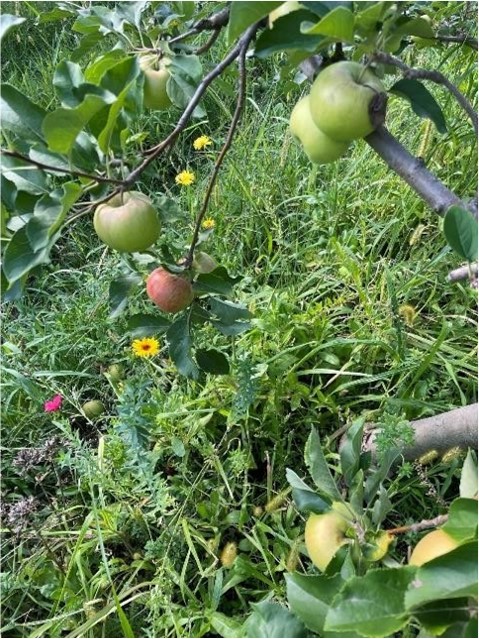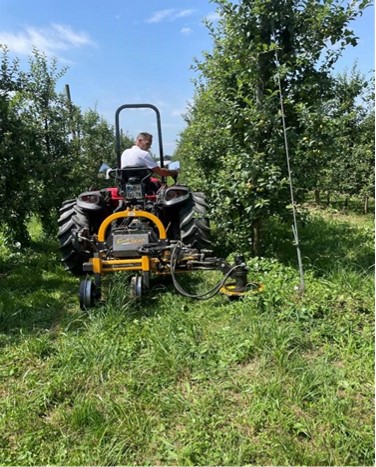Avoiding glyphosate use in apple orchards through cover crops and integrated mechanical weeding - an example from Slovenian farms with an organic approach
Pisa (Italy), March 2024 – Wild weeds growing in apple orchards can negatively affect farmers’ yields because of competition with cultivated trees for water and nutrients. Weed management is therefore a crucial issue for many farmers, which is often tackled by using glyphosate or other pesticides. Given the potential problems linked to pesticide use for people and the environment, in the last few years researchers and farmers have been searching for sustainable alternative solutions.
Within the European research project IPMWORKS, sustainable alternative solutions to pesticides have been tested in the apple orchards of selected Slovenian farms. Here, weeds have been effectively controlled by sowing cover crops and using integrated mechanical weeding. These techniques have mainstream potential since they can be applied both in conventional and organic farming.
Cover crops are sown by farmers under the canopy of apple trees not to be harvested but to compete with wild weeds, increase plant diversity in apple orchards and support ecosystem services such as pollination. Field research conducted thanks to the IPMWORKS project proved that cover crops with low undergrowth, annual flowers, perennial flowers, and low soybeans grown under apple trees are good alternatives to glyphosate use. According to the results obtained, to successfully facilitate weed management, the key is to select the most suitable cover crop depending on the environmental conditions of the orchards.

Besides cover crops, integrated mechanical weed management is a good alternative to glyphosate too. Integrated mowing systems and integrated tillage systems allow farmers to control weeds above the apple tree canopy layer at low costs. Machinery specifically designed to avoid damaging apple trees and roots while removing weeds from tree rows was tested and successfully implemented at the farm level within the IPMWORKS project.
Pesticide alternatives such as cover crops and integrated mechanical weeding were embraced in the three Slovenian farms constituting one of the farmer hubs of the Horizon 2020 project IPMWORKS. The purpose of farmer hubs is for farmers to exchange their knowledge on applying integrated pest management (IPM) strategies, facilitated by hub coaches: agronomic technicians working with scientists, who disseminate among farmers scientific results related to IPM techniques. In this way, farmers can improve their IPM-based practices and implement the ecological transition. The Slovenian hub is led by one of the hub coach from the Horticulture Center Maribor Biserka Donik Purgaj, who summarised: “The farmers involved in the IPMWORKS project were able to reduce or eliminate the use of pesticides in their apple orchards. These first results are encouraging, and we hope to expand them further on a national scale”.
By working together, sharing knowledge, and critically evaluating each other perspectives, this alliance between farmers, agronomic technicians and scientists can bring concrete progress in the ecological transition reducing the use of glyphosate and other pesticides on farms, with benefits for farmers, consumers, and the environment.

About IPMWORKS
IPMworks (full project name: “An EU-wide farm network demonstrating and promoting cost-effective IPM strategies”) is a H2020 financed project gathering 31 partners from 16 European countries, coordinated by the French National Research Institute for Agriculture, Food, and the Environment (INRAE).
The project objective is to promote the adoption of IPM strategies, based on an EU-wide network of farmers, who will progress further in the adoption of IPM through peer-to-peer learning and joint efforts, as well as demonstrate to other farmers that holistic IPM “works”; i.e. allows a low reliance on pesticides with better pest control, reduced costs, and enhanced profitability.
The project partners coordinate existing networks promoting IPM and launched new hubs of farms in regions or sectors where IPM pioneers were not yet engaged in relevant networks. Advisors coordinating hubs have a major role in facilitating knowledge sharing, coaching farmers to find their own IPM solutions, and organizing local demonstration activities.
IPMworks stimulates access to the IPM Decisions platform and provides information on IPM methods. It will collect data for comparing IPM strategies and share results and dissemination material through channels widely used by farmers, broadcasting IPM success stories. It will organise training and produce training materials, targeting both farmers outside the network and advisory services, to prepare for the future dissemination of the peer-to-peer learning approach and the general adoption of IPM throughout the EU.
Contacts details
Slovenian farmer hub coach: Institute of Agriculture and Forestry of Maribor, Slovenia
Biserka Donik Purgaj
biserka.donik@kmetijski-zavod.si
Orchard sector leader: Group of Agroecology, Sant’Anna School of Advanced Studies of Pisa, Italy
Stefano Carlesi
stefano.carlesi@santannapisa.it
IPMWORKS coordinator: INRAE, France
Nicolas Munier-Jolain
nicolas.munier-jolain@inrae.fr